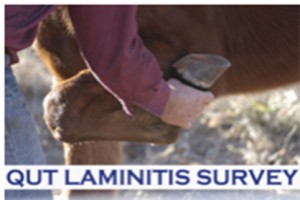Worldwide Survey of Equine Laminitis Seeking Study Participants
QUT Laminitis Study
Overview
What: A worldwide survey of laminitis recurrence
When: Starts January 1st, 2014 (Southern hemisphere) and March 1st, 2014 (Northern hemisphere)
How: Veterinary diagnosed cases of laminitis reported by online surveys
Why: Equine laminitis remains a significant welfare issue
Details: www.qut.edu.au/research/laminitis-survey
Contact: Dr Melody de Laat; melody.delaat@qut.edu.au
Background
Equine laminitis is a major welfare issue for horses worldwide. The disease is reported to be common, with estimates of its prevalence in the equine population ranging from 1% to 34%. Laminitis is one of the most common reasons why horse owners seek veterinary advice. The disease has many causes and the most widespread form of laminitis is associated with obesity, metabolic disease and the feeding of high-energy diets. With improvements in pasture quality and modern husbandry practices, overfeeding has become common, and equine obesity is becoming more prevalent. Thus, the incidence of laminitis is likely to increase. Current epidemiological knowledge of laminitis is limited. This is preventing the development of effective treatment and prevention strategies. Once a horse develops laminitis, it may also be at a greater risk of suffering from subsequent episodes, particularly if the underlying metabolic disease remains untreated.
The Study
The QUT Laminitis Survey aims to determine how often laminitis recurs and investigate what risk factors and management strategies influence the rate of recurrence. The study will recruit cases of laminitis (of any type, grade or cause) through participating veterinarians and consenting horse owners. Information will be gathered by online questionnaires and cases will be followed for up to two years. Assistance is available for study participants. Please see our website for details.
Participation
Participation in this study is entirely voluntary. The involvement of horse owners and their veterinarians is vital to the success of the study. If your horse develops laminitis and you would like to be involved, please encourage your veterinarian to enrol your horse. Free laboratory tests (ACTH and insulin) will be provided for study participants.
Please help us to conquer laminitis!











